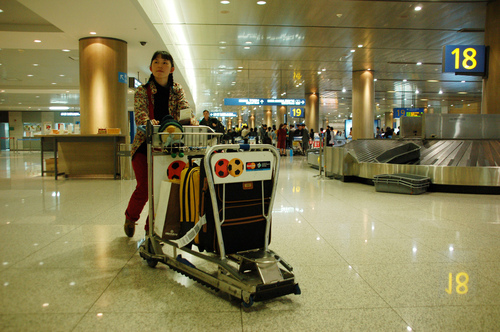
Airports create awkward scenes for immigrants
arriving at and departing from their homelands. Family members and
friends expect immediate and close interaction at the airport and on the
way leading from and to it. Immigrants, for starters, find themselves
time and again overwhelmed by the human intervention skills they have to
develop. Surprisingly, everyone wants to fair the immigrant goodbye but
cannot come to the airport because the flight lands or takes off at an
unreasonable time of the day. When it is a night flight they have an
important meeting the day after; and when required to come to the
airport during the day--well--they obviously work. Already at this point
immigrants find themselves taking the blame for these unpredictable
inconveniences: "Why didn't you schedule your flight for the weekend?"
The logistic preparations involved in the departure or arrival of immigrants also create unpleasant situations. For some reason there must be that one person who cannot commute to the airport on his- or her own and tries to get a ride from those who go to the airport. But space is not always available because of three, not-so-light pieces of luggage immigrants are forced to take with them. "No problem," says the friend who cannot commute, "just put the big piece of luggage on top on the car and I'll hold it; I have a strong left arm." How does one suddenly become an expert in spontaneous transport techniques whose left arm only can hold 50 pounds?
Responding to friends and family's emotional reactions constitutes another difficulty immigrants have to face. Upon arrival, mothers jump on their sons, and fathers cry on their daughters' shoulders. And then friends join in the "fun." Did you ever stop to think whether your friends do it because they really want to and are thrilled to see you? Did it occur to you that by expressing emotions similar to those of your family your friends simply try to avoid an awkward scene where they would be seen as not enough emotional? Don't get me wrong. Every person has the right to express their feelings however they wish to. But I just hope friends would feel open enough to do whatever they want to do when they see their friend after a long time away.
A popular cliché, perhaps, but promises are (indeed) hard to keep. Trying to make travelling immigrants feel better about their departure, friends and family often promise to be in touch with their beloved ones. Airports are rife with statements like "we'll be in touch!" and "we'll talk at least twice a week." Even mere acquaintances, people with whom you never really spoke on a daily basis become your best friends and promise to be the ones waiting for you at the airport. But it never happens.
At the end of the day, nobody really asks you how come you did not stay in contact. Friends and family forgive. And admit it--neither do you wonder why nobody called in two months. What do you think: Is this the only good thing that stems from the synthesis of travel, emotion, friends, and family?

Leave a comment